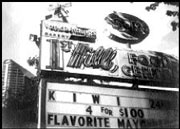IF YOU WANT to see the hole that’s been blown in the Seattle economy, just follow Madison Street a short way east from downtown. There, at the base of First Hill, is a block-long hole in the ground that was to be the foundation for a 16-story luxury apartment tower. Late last year, the developer put the project on indefinite hold, awaiting better “market conditions.”
For nearby residents, the hole is dispiriting, not just as an eyesore, but because of what the project promised and what it replaced. For over 50 years, that corner of Eighth and Madison was home to the First Hill Food Center, an old-fashioned, family-owned supermarket, whose sign was the closest thing to a First Hill landmark. Though its dingy aisles were narrow, and selection was limited, the store was a valuable lifeline for the hundreds of senior citizens who live in surrounding buildings.
“There are a lot of elderly people in these apartments, and for years that was their place,” says Father Michael Ryan, pastor at St. James Cathedral, a block from the site. “It wasn’t the best facility, but it was what they had.”
The store was also oddly famous as an underground shrine to Bruce Lee. The owner of the store, Taky Kimura, had been Lee’s best friend during the martial artist’s Seattle years, and for decades Kimura gave free weekly classes on Lee’s philosophy and technique in the Food Center basement.
All that ended last summer when Kimura, now in his late 70s, sold his land and retired. The buyer was AvalonBay Communities, an Alexandria, Va.-based apartment developer whose specialty is creating “a luxury living experience second to none.” AvalonBay planned to build a 16-story high-rise with four floors of office space and 154 apartments—studios to two-bedrooms at an average rent of about $1,990.
First Hill locals were by no means opposed to the project. “We were all very excited,” says John Dolan, a longtime community activist. “This is an area of First Hill that hasn’t seen residential development since perhaps World War II, certainly since the freeway went up in the ’60s.” Dolan says AvalonBay was “very inclusive,” very diligent in seeking community input. Chief among the company’s pledges was that a new and improved supermarket would be up and running within 18 months on the ground floor of the building.
Shortly after knocking down the existing store, however, AvalonBay halted further work at the site. “Our initial concern was that the office market was deteriorating,” says Michael Lyons, development director for AvalonBay’s Seattle-area projects. “Then we saw the residential market follow suit. It put us in a difficult situation.”
Indeed, AvalonBay came in at the tail end of the biggest apartment construction boom in recent Seattle history. Through most of the 1990s, an average of 200 to 300 new apartment units were built in central Seattle each year, according to Mike Scott of local apartment analysts Dupre+Scott. But last year, 1,707 new, mostly high-end units were put on the market in the area between Pioneer Square and the Ship Canal. Scott says that may well be the most added in any single year since the 1920s. “That’s a lot of product,” he says, “and all roughly in the same price range.” Vacancy rates have been inching up throughout the city over the last six months, and Scott says the rates are highest—into the double digits—for luxury buildings like the one AvalonBay plans to build.
Michael Lyons says AvalonBay is “very committed to bringing the project to completion.” But he thinks it could be at least a year before construction begins again. “If we can put together a tenant [for the office space] and see the residential market come back, we’ll move forward. I know people miss that grocery store and are anxious to see it back.”
“We miss the store terribly,” says 83-year-old Peggy Van Hee, who lives in the nearby Chancery Place Apartments, which are occupied by retirees and disabled people. “I’m in fairly good health, but I couldn’t walk [up the hill to Broadway, where there’s a QFC] and back with groceries.” Says Father Ryan of the situation: “It seems like a real breach of promise.”
Darlene Flynn, who oversees First Hill for the city’s Department of Neighborhoods, says she can’t imagine the company is going to delay the project for too long, since it has already invested so much in the site. “They’ve gone through all the city processes,” she says, “architecture and design review, geo-technical work; they’ve done the excavating and shoring. There’s a lot in that hole in the ground.”








